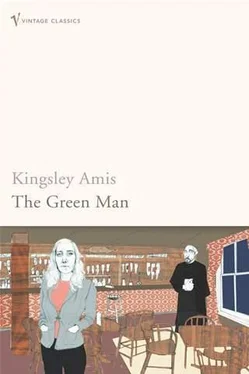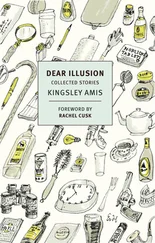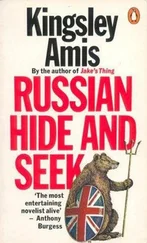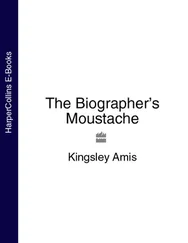Kingsley Amis - The Green Man
Здесь есть возможность читать онлайн «Kingsley Amis - The Green Man» весь текст электронной книги совершенно бесплатно (целиком полную версию без сокращений). В некоторых случаях можно слушать аудио, скачать через торрент в формате fb2 и присутствует краткое содержание. Жанр: Старинная литература, на английском языке. Описание произведения, (предисловие) а так же отзывы посетителей доступны на портале библиотеки ЛибКат.
- Название:The Green Man
- Автор:
- Жанр:
- Год:неизвестен
- ISBN:нет данных
- Рейтинг книги:5 / 5. Голосов: 1
-
Избранное:Добавить в избранное
- Отзывы:
-
Ваша оценка:
- 100
- 1
- 2
- 3
- 4
- 5
The Green Man: краткое содержание, описание и аннотация
Предлагаем к чтению аннотацию, описание, краткое содержание или предисловие (зависит от того, что написал сам автор книги «The Green Man»). Если вы не нашли необходимую информацию о книге — напишите в комментариях, мы постараемся отыскать её.
The Green Man — читать онлайн бесплатно полную книгу (весь текст) целиком
Ниже представлен текст книги, разбитый по страницам. Система сохранения места последней прочитанной страницы, позволяет с удобством читать онлайн бесплатно книгу «The Green Man», без необходимости каждый раз заново искать на чём Вы остановились. Поставьте закладку, и сможете в любой момент перейти на страницу, на которой закончили чтение.
Интервал:
Закладка:
‘I’m going to see Nick’s old supervisor, yes, but not anybody in the sense you mean.’
‘Mm. What’s Nick going to do all the time?’
‘He can please himself. He’s brought some of his university stuff along. Or he could do something with Amy.’
‘Why don’t you take them both with you into Cambridge? There’s a lot more there they could—’
‘I’d have to hang about waiting for them, and I told you I might be coming more or less straight back. Anyway, I’m going on my own.’
‘Oh, all right. You know Lucy’s off this morning?’
‘She’ll be here again tomorrow for the funeral. But say goodbye to her for me if you like.’
‘Do you want me to do the wages and stamps and things?’
‘Would you? I must be off.’
I took a quick and fairly small nip in the still-room and was soon belting up the A595 in the Volkswagen. It was a genuine hot day, with the humidity down for once and the sunshine unfiltered by haze. Vehicles flashed and glistened as they moved, their bare metal seemingly burnished, their paintwork sheened with oil. They hurtled past me in the opposite direction, swung into and out of corners ahead, pulled aside to overtake as if with an extra dash, like actors conscious of appearing against an advantageous background. Even in the deep shadows of the trees lining the road, individual branches and clusters of leaves and patches of soil reflected light with an intensity, and yet with a depth of colour, that I was used to seeing only in Alpes-Maritimes. In the middle distance, refraction-mirages, illusory strips of still water lying across the road, constantly came into view and vanished. Beyond Royston, the confluence of the A10 and the A505 brought heavier traffic, but I kept my average up to forty-five or better. The outskirts of Cambridge rolled by, with the familiar thickening of wayside timber and shrub that suggests the approach to a forest rather than a town. Then this disappeared into the fenland openness of the place itself, never crowded-looking even at mid-morning in term-time, and the landmarks were there: the Leys School, Addenbrookes Hospital, Fitzwilliam Street (where I had had digs when sitting my scholarship in 1933), Peterhouse, Pembroke and finally, more or less side by side with St Catherine’s on the corner of Trumpington Street and Silver Street, the long bitten-off rectangle of St Matthew’s, a flat-fronted Tudor structure not too badly restored at the end of the eighteenth century.
I found a parking space only a hundred yards from the main gate. The outer walls bore chalked or whitewashed slogans here and there: COMMUNALIZE COLLEGE ESTATES, NUDE LIE-IN GIRTON 2.30 SAT., EXAMS ARE TOTALITARIAN. First one whiskered youth in an open frugiferous shirt, then another with long hair like oakum, scanned me closely as they passed, each slowing almost to a stop the better to check me for bodily signs of fascism, oppression by free speech, passive racial violence and the like. I survived this, entered and cross the front court (which looked oppressively clean to my eyes), went through a low archway and ascended to the square panelled study-sitting-room that overlooked the long slope of the Fellows’ garden.
Duerinckx-Williams, thin and dry-looking, with a stoop and paraded short sight although well over ten years younger than I, got to his feet and smiled at me fixedly. I had met him perhaps a dozen times on occasions involving Nick.
‘Salut, vieux—entrez done. Comment ça va?’
‘Oh, pas trop mal. Et vous? Vous avez bonne mine.’
‘Faut pas se plaindre.’ Then he turned grave, or graver still. ‘Nick told me of your loss. May I offer my sympathy?’
‘Thank you. He was nearly eighty, you know, and hadn’t been well for some time. It was no great surprise.’
‘Wasn’t it? In my experience’—he made it sound as if this went back to the time of the foundation of the college, give or take a century or so—’these things are never imaginable in advance. But I’m glad to see you’re not unduly bowed down. Now, can I offer you something? Sherry? Beer? Port? Tea? Whisky? Claret?’
It was kind and intelligent of him to pretend, as usual, not to understand about drink, and so allow me to choose what I wanted without embarrassment. I said a little whisky would be very nice. While he got it for me, and made further show of incomprehension in pouring out rather more than half a gill, he came up with some amiabilities about Nick. Then, when we were sitting on either side of the splendid late-Georgian fireplace, he asked what he could do for me. I told him only of my interest in the history of my house and particularly in Underhill, of a reference to his diary in a book I had come across and of my hope that he, Duerinckx-Williams, would telephone the librarian of All Saints’ and assure him of my bona fides.
‘Mm. How urgent is your desire to see this man’s diary?’
‘Not at all, really,’ I lied. ‘It’s just that I so seldom get the chance of a day off like this, and I thought I’d take advantage of it. Of course, if it’s going to be…’
‘No no, I’ll be happy to do all I can. It’s merely that the librarian may not be there at this precise instant. At All Saints’ everybody seems to tend not to be there so much of the time. But I can readily establish that. Would you excuse me a moment?’
He telephoned briefly and rejoined me.
‘We’re in luck, Maurice. He’s not only there but also free of entanglements. Would you care for some more … of that?’ he asked, pretending now to have forgotten what I had been drinking.
‘Uh … no thank you.’
‘In that case we might be on our way. No no, I assure you it’s no trouble. Three minutes’ walk at the most. As you know.’
Four minutes later we had passed through a carved wooden doorway of great age and were walking down the All Saints’ library, a lofty and narrow room in the shape of an immense L, with some good Victorian stained glass in the windows at the angle. There was a characteristic smell, chiefly of dust and ink. The librarian came to meet us with a demeanour that managed to be haughty and deferential at the same time, like that of a West End shopwalker. There were introductions and explanations.
‘Underhill,’ said the librarian, whose name was evidently Ware. ‘Underhill. Yes. Fellow of the college in the 1650s. Yes.’ Then he said with great emphasis, ‘Never heard of him.’
‘Your manuscript collection is pretty extensive, isn’t it?’ asked Duerinckx-Williams.
‘Oh, it’s extensive all right,’ said Ware, a little put out at this irrelevant reminder.
‘Then a Fellow’s personal papers, found here and inspected soon after the beginning of the last century, as I understand the case …?‘
Ware relented a little. ‘It’s possible. There’s an autograph catalogue dating from the 1740s, when the libraries first started taking an interest in manuscripts and older stuff generally. We rather led the way there, it seems. Here it is. Or rather its photocopy. Splendid invention. Underhill. Underwood, Aubrey. Several verses upon occasions, with part of Philoctetes, an heroical poem after the manner of Mr Dryden. How dreadful. That wouldn’t be your man, would it? No. Wrong name, for one thing. Nothing by any Underhill. What a pity. I am sorry.’
‘There’s no other collection it might be in?’ I asked.
‘Not relating to the date you gave me, no.’
‘But my author saw it in the 1810s or thereabouts.’
Duerinckx-Williams peered at the thin regular handwriting. ‘In certain circumstances, such as the loss or detachment of the first leaf or leaves, might not the diary have been entered under some general head referring to anonymous writings?’
‘Oh, I don’t know about that,’ said Ware, momentarily put out again. ‘It’s possible. Let’s see. Yes, under Anonymous, in fact. Anonymous, a tract discovering the vices of Popery, notably its Mariolatrous practice, by a gentleman, never imprinted. Fascinating, but not your quarry, I think. Anonymous, a quantity of sermons, and prayers, and pious thoughts, by the late rector of St Stephen’s, Little Eversden. No. Anonymous, of sundry matters, by a man of learning. Not over-informative, is it? A possibility, I suppose. Anonymous…’
Читать дальшеИнтервал:
Закладка:
Похожие книги на «The Green Man»
Представляем Вашему вниманию похожие книги на «The Green Man» списком для выбора. Мы отобрали схожую по названию и смыслу литературу в надежде предоставить читателям больше вариантов отыскать новые, интересные, ещё непрочитанные произведения.
Обсуждение, отзывы о книге «The Green Man» и просто собственные мнения читателей. Оставьте ваши комментарии, напишите, что Вы думаете о произведении, его смысле или главных героях. Укажите что конкретно понравилось, а что нет, и почему Вы так считаете.











